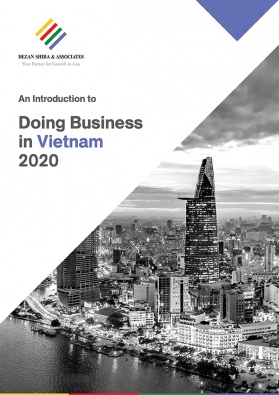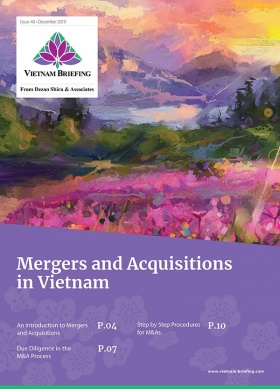Representative Office Dissolution Part 3: Documenting Expenses
In the final part of this three-part series, we examine how to deal with expenses related to the parent company and local RO, ‘suspect’ payments and expenses paid to foreign suppliers.
Expenses incurred for expatriate employees of parent company
For employees of the parent company visiting the RO’s office for short periods of time, traveling and accommodation costs are typically covered by the RO.
Several common expenses incurred for such employees are visa application fees, flight tickets, accommodations, and meal allowances.
Businesses sometimes make errors thinking that the expenses incurred for the parent company’s employees should be similar to those of the RO’s employees.
However, as per tax authorities, employees of the RO’s parent company are not under the RO’s payroll, and any expenses incurred for such employees should be treated as their assessable income and be taxed at the applicable tax rate of 20 percent for non-tax residents accordingly.
Therefore, the rational approach is that traveling expenses incurred for parent company’s employees to visit Vietnam should be paid by the parent company instead.
However, if the traveling costs must be paid by the RO, there should be documented agreements to justify that the RO is only making payments on behalf of the parent company. It is important to note that the expenses might still be subject to the tax auditors’ inquiries and they will consider if the RO has solid grounds to justify the nature of such expenses.
In addition to the required travel expense documents as mentioned earlier, the RO may use supporting evidence such as:
- Internal agreement between the RO and its parent company, which stipulates terms of payment-on-behalf and reimbursements of travel expenses for employees;
- Assignment letter from the parent company showing the duration of the employees’ trip in Vietnam;
- Itinerary specifying such employees’ work and vacation details during their visit to Vietnam; and
- Evidence of payments and reimbursements of travel expenses between the RO and its parent company.
“Suspect” payments or reimbursements
Investors should be aware that during tax finalization, the tax authority often undertakes a thorough audit of the RO’s cashbooks, bank statements and other bookkeeping records to review the legitimacy of the RO’s expenses incurred during its operation.
If any payments or reimbursements are deemed vague or suspicious, they will be subject to an intense review with tax officers requesting extensive supporting evidence.
Based on our practical experience with tax audits for RO’s, we provide some examples of payments or reimbursements which are usually considered “suspect” from the tax authority’s point of view:
- Example 1: A RO is allowed by its parent company to cover the flight tickets of its expatriate employees as well as their family members returning to their home country once per year. The Chief Representative Officer (CRO) of the RO previously had tax advisory experience and knew that the coverage for expenses of expatriate employees’ family members are taxable under Vietnamese PIT regulation. In an attempt to sidestep the tax authority, the CRO suggests that flight tickets should be bought through a flight agent so that the booking details are not shown on the issued tax invoices. However, the tax auditor easily identifies those invoices for flight tickets as unreasonable when comparing to other similar payments. Consequently, all flight ticket payments are deemed as the expatriate employees’ assessable income and subject to PIT withholding rate of 10 percent.
- Example 2: A RO allows its promotion specialist to incur entertainment expenses such as business dinners, gifts, and wines when meeting potential business partners. The employees pay for such expenses themselves and keep the tax invoices, knowing they would receive reimbursements from the RO in the form of a “special responsibility” allowance. Subsequently, the tax auditor audits all payments made to the employees and discovers the inconsistency of such allowance payments. The RO is vague on the nature of such allowances and fails to provide an adequate explanation of the nature of the payments. As a result, such payments are deemed as “suspect” by the tax auditor and counted toward those employees’ assessable income, which is subject to the PIT withholding rate of 10 percent.
- Example 3: During a visit of the parent company’s staff, the RO decides to throw a party at a luxury lounge with the attendance of all employees. The party’s bill is paid by the CRO’s credit card and reimbursed later through the RO’s bank account. Upon auditing the RO’s bank statements and learning the nature of such reimbursement, the tax auditor imposes an additional tax amount of 20 percent for non-resident as well as an interest penalty at 0.03 percent per day.
Expenses paid to foreign suppliers or services providers
These expenses are commonly disregarded by RO’s by assuming that such expenses are reasonable for daily operation and there should be no tax implications involved. Many RO’s and tax professionals believe that tax audits of ROs are carried out by tax officers from the PIT Divisions of local tax departments who lack experience in auditing business taxes. This is a serious misconception, which often costs the RO substantial amounts of additional tax payable and imposed penalties upon final tax audit for dissolution.
It is recommended that the RO should assess tax implications on their expenses paid to foreign companies or individuals since most of such payments are subject to Foreign Contractor Tax (FCT), also known as “withholding tax”. FCT is not a separate type of tax but rather comprises of VAT and income tax (either CIT or PIT) imposed on payments from local organizations to foreign companies or individuals.
Such payments are considered as income earned in Vietnam in which the Vietnamese parties are liable to declare and make payments on behalf of the foreign organizations.
Examples of common expenses paid to foreign organizations, which are subject to FCT declaration and remittance by the RO include:
- Renovation and installation of the RO office;
- Purchases of specialized office equipment with installation services attached;
- Subscriptions to specialized software (I.e. Xero, Slack, and Adobe, etc.);
- Employees’ enrolments and memberships of foreign associations (I.e. CPA Australia, CIMA or CFA, etc.); and
- Training of employees (includes online training).
Practically speaking, if the RO’s expenses incurred with foreign organizations are settled by its parent company, there will be no FCT implications involved.
However, there would be cases where the RO itself must enter and settle contracts with foreign organizations.
Such expenses should be assessed for tax implications; if they are subject to FCT, the RO should carry out proper tax code registration as well as declaration and remittance of FCT to the state budget to mitigate the risk of ending up with substantial additional tax payable and penalties imposed upon dissolution.
Apart from genuine mistakes in PIT declaration, these are the most common expenses, which are frequently challenged by the tax authorities during tax audits of ROs.
Considering Vietnam’s extensive red tape regarding tax, ROs should be aware of the extensive requirements of supporting documents as well as necessary tax procedures and be well-prepared for future potential tax audits.
This article has been prepared for general guidance on matters of interest only and does not constitute professional advice. For further information and assistance please contact our Tax, Payroll and HR professionals at Dezan Shira & Associates.
About Us
Vietnam Briefing is produced by Dezan Shira & Associates. The firm assists foreign investors throughout Asia from offices across the world, including in Hanoi and Ho Chi Minh City. Readers may write to vietnam@dezshira.com for more support on doing business in Vietnam.
- Previous Article Representative Office Dissolution Part 2: Tax Documentation
- Next Article Vietnam will Anreize zur Bekämpfung der Auswirkungen von COVID-19 schaffen







